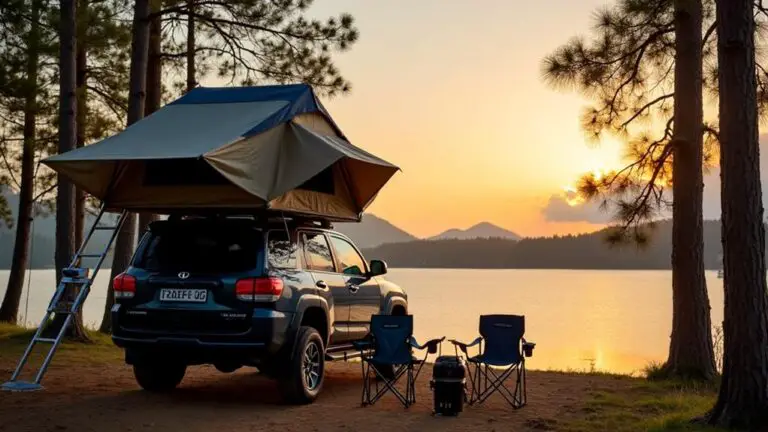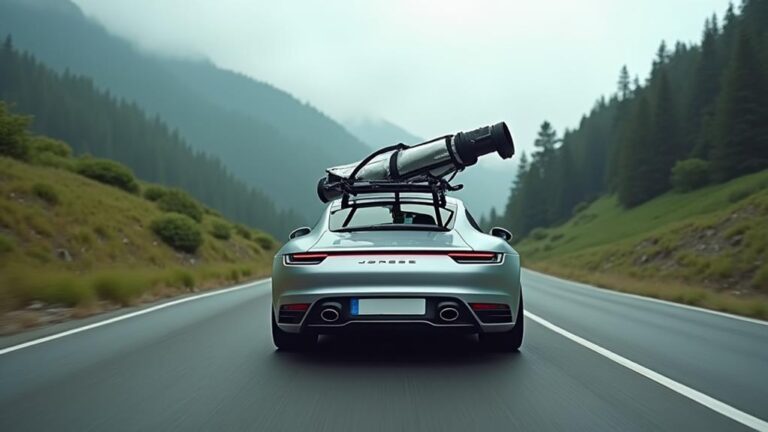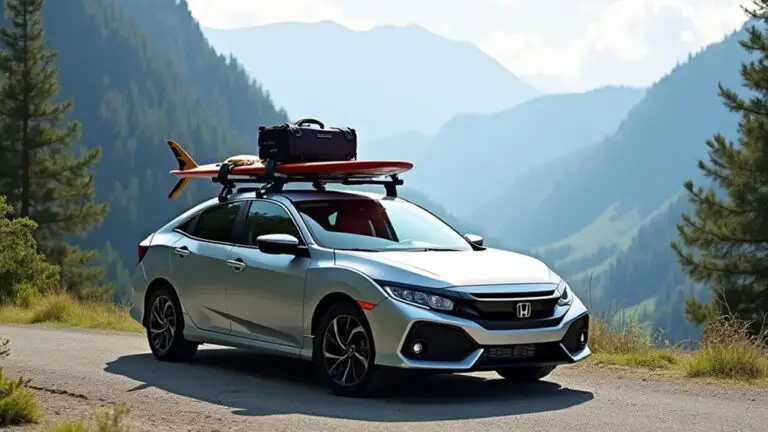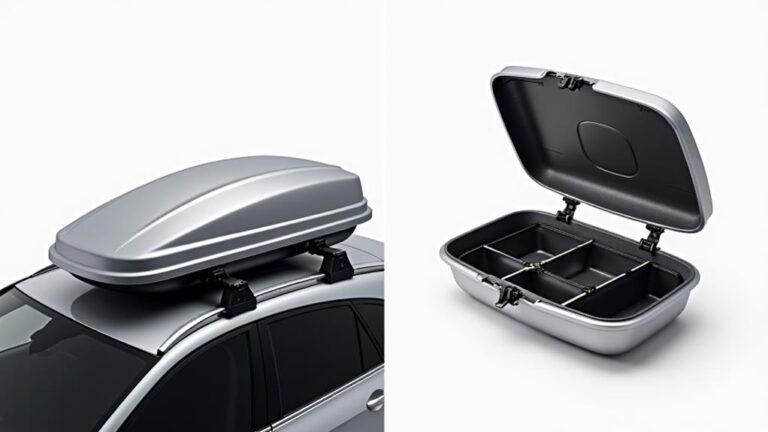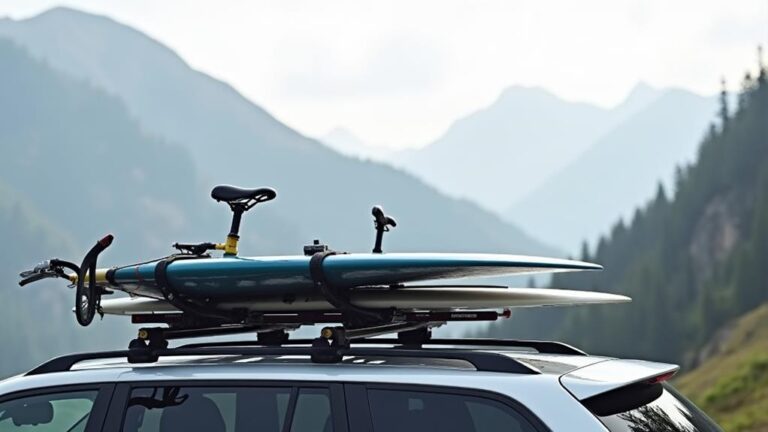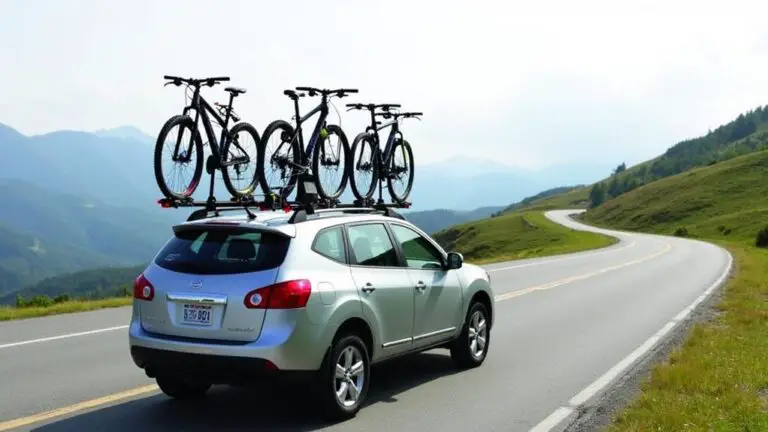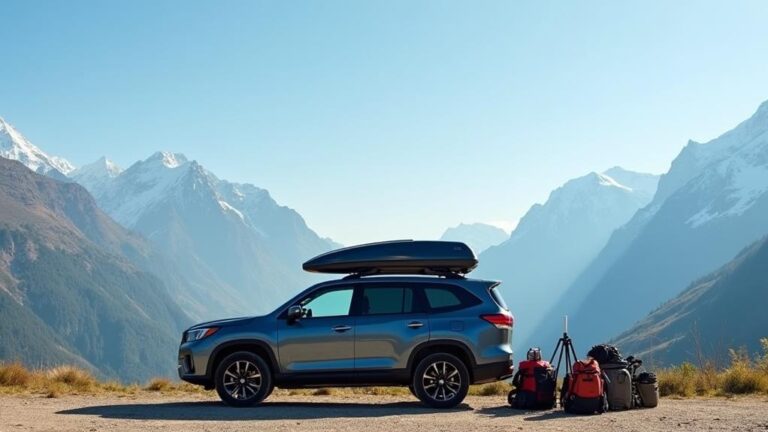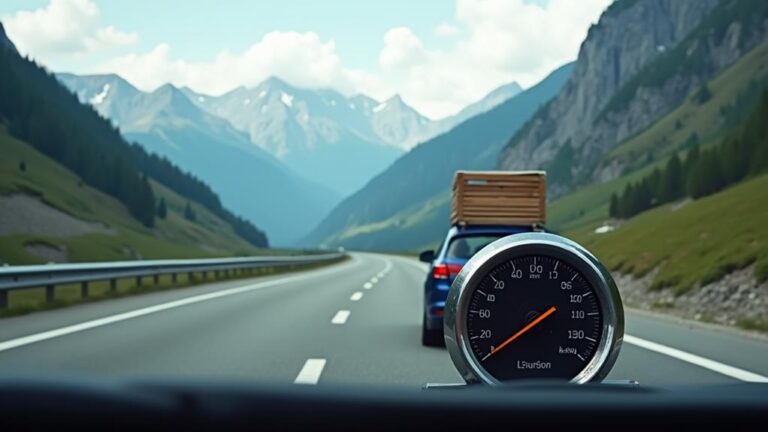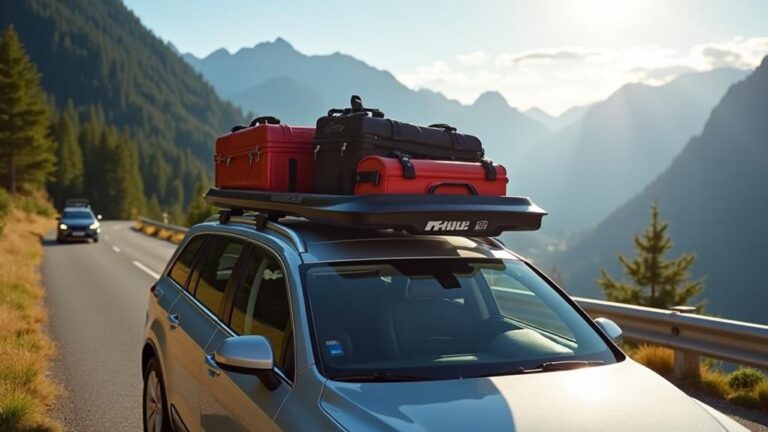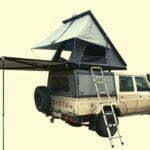Imagine waking up to a breathtaking sunrise from the comfort of your vehicle's rooftop, having spent a dry and peaceful night in the midst of a rain-soaked forest – this is exactly what Sarah experienced on her recent camping trip with a Thule roof top tent. As you consider investing in one, you're likely wondering what makes Thule roof top tents stand out from the rest. With their reputation for durability and ease of use, it's essential to weigh the benefits and features of these tents to determine if they're the right fit for your next adventure.
Key Takeaways
- Thule roof top tents offer a hassle-free camping experience with tool-free installation systems and pre-assembled components.
- Elevated design provides protection from flooding, rough terrain, and wildlife, while ensuring a dry and comfortable sleeping environment.
- Thule's roof top tents come in various sizes to suit different needs, with floor areas ranging from 20 to 40 square feet.
- Load capacity limits range from 650-770 pounds, depending on the model, to ensure safe support of occupants and gear.
- Thule roof top tents are made with durable materials, including aluminum and steel frames, and waterproof, UV-resistant fabrics.
Benefits of Thule Roof Tents
One key benefit of Thule roof top tents is the significant time you'll save during camp setup.
Unlike traditional ground tents, Thule roof top tents don't require staking or laying out a footprint, allowing you to quickly attach the tent to your vehicle's roof rack. This streamlined process gets you settled in faster, giving you more time to enjoy the outdoors.
The roof advantages of Thule roof top tents also provide additional Camping convenience.
Since the tent is elevated off the ground, you're protected from flooding, rough terrain, and wildlife. The waterproof roof and walls ensure a dry and comfortable sleeping environment, even in harsh weather conditions.
Additionally, the elevated design allows for better ventilation and airflow, reducing condensation and moisture buildup inside the tent.
Thule roof top tents also offer a more private and secure camping experience.
The enclosed design and elevated position make it harder for wildlife to enter the tent, giving you peace of mind while you sleep.
Choosing the Right Model
When choosing the right Thule roof top tent model for your needs, you'll need to consider several key factors.
First, assess your vehicle's roof space and the number of people the tent will accommodate to determine the ideal tent size.
You'll also want to evaluate the tent's weight and durability, as well as the available features options, such as fabric type, window style, and storage capacity.
Tent Size Considerations
Choosing the right Thule roof top tent model largely depends on the space you need.
When considering your camping comfort, think about the number of people the tent will accommodate and the space you need to move around. Thule's roof top tents come in various sizes, so you can choose a model that suits your needs.
Occupancy limits range from two to four people, depending on the model. The two-person tents are ideal for solo travelers or couples, while the four-person tents are better suited for families or groups of friends.
When choosing a model, consider the height and width of the tent, as well as the floor space. Thule's tents have varying floor areas, ranging from approximately 20 to 40 square feet.
To ensure a comfortable camping experience, also consider the headroom and the tent's ability to accommodate your gear.
Thule's roof top tents often have ample storage space, but it's essential to choose a model that can fit all your equipment and still provide enough room to move around comfortably.
Weight and Durability
Opting for a Thule roof top tent model that balances weight and durability is crucial for a hassle-free camping experience.
When selecting the right model, you'll want to consider load capacity limits to ensure the tent can safely support the weight of occupants and gear. Thule roof top tents typically have a load capacity range of 650-770 pounds, depending on the model.
Be sure to factor in the weight of any additional gear or accessories you plan to bring along.
The frame construction materials used in Thule roof top tents also play a significant role in determining durability.
Thule uses high-strength, lightweight materials such as aluminum and steel for their frames, which provide excellent support and stability.
The fabric used for the tent is also designed to withstand harsh weather conditions, with waterproof and UV-resistant materials that can handle heavy rain and direct sunlight.
Tent Features Options
Tent Features Options
(Choosing the Right Model)
Functionality is key to a successful camping experience, and Thule roof top tents offer a range of features to suit different needs and preferences. You'll want to consider factors such as tent fabric options, window design choices, and interior space when selecting the right model for your camping needs.
| Feature Options | Description |
|---|---|
| Tent Fabric | Choose from breathable, waterproof, and UV-resistant fabrics, such as polyester or nylon |
| Window Design | Select from large windows for panoramic views, or smaller windows for added security |
| Insulation | Consider models with built-in insulation for colder climates or four-season camping |
| Interior Space | Opt for models with adjustable interior layout or additional storage compartments |
When choosing a Thule roof top tent, consider your specific camping needs and preferences. If you prioritize ventilation and airflow, look for models with large windows and breathable fabrics. If you need additional storage space, select a model with adjustable interior layout or additional compartments. By carefully evaluating these features, you can find the right Thule roof top tent to suit your camping style.
Key Features to Consider
When evaluating Thule Roof Top Tents, you'll want to consider key features that impact their performance and usability.
You should prioritize durability and weather resistance, assessing the materials and construction methods used to ensure they can withstand various environmental conditions.
Additionally, you'll need to examine the ease of the installation process, including the tools required, the complexity of the setup, and whether it can be accomplished solo or requires assistance.
Durability and Weather Resistance
A key consideration for any rooftop tent is its ability to withstand various environmental conditions and rough handling.
When shopping for a Thule roof top tent, you'll want to examine its durability and weather resistance features closely. Look for rust protection, such as galvanized or powder-coated steel frames, which will help prevent corrosion and extend the tent's lifespan.
In addition to rust protection, consider the type of waterproof coatings used on the tent's fabric and seams.
Thule's roof top tents feature waterproof and breathable fabrics, such as nylon or polyester, with a waterproof coating to prevent water penetration. The seams are also sealed to ensure a watertight seal.
These features will help keep you dry and comfortable in wet conditions.
You'll also want to inspect the tent's stitching, zippers, and other hardware for signs of durability and weather resistance.
Thule's roof top tents are designed to withstand harsh weather conditions, including heavy rain, snow, and high winds.
Ease of Installation Process
Mounting a roof top tent on your vehicle can be a daunting task, but Thule's designs aim to simplify the process.
Their rooftop tents are engineered to provide a hassle-free experience, allowing you to focus on your outdoor adventure.
Thule's ease of installation process is a key feature to consider when choosing a rooftop tent.
Here are some benefits you can expect:
- Tool-free installation: Many Thule rooftop tents come with a tool-free installation system, making it easy to set up and take down your tent.
- Pre-assembled components: Thule's rooftop tents often come with pre-assembled components, reducing the time and effort required for installation.
- Clear instructions: Thule provides detailed, easy-to-follow instructions to ensure a smooth installation process.
- Universal compatibility: Thule's rooftop tents are designed to be compatible with a wide range of vehicles, making it easy to find a tent that fits your needs.
With Thule's rooftop convenience, you can enjoy a hassle-free experience when setting up your tent.
Their attention to detail and commitment to ease of use make them a top choice for outdoor enthusiasts.
Installation and Setup Process
Installing a Thule roof top tent on your vehicle requires careful planning and execution.
Before starting the installation process, ensure you have a suitable vehicle with adequate roof clearance. Avoid potential roof clearance issues by verifying your vehicle's roof dimensions and the tent's height.
Check for any obstructions, such as roof rails or antennas, that may interfere with the tent's installation. Consult your vehicle's owner's manual and the Thule roof top tent's instructions for specific clearance requirements.
To streamline the installation process, organize your tools and materials in advance.
Utilize tool organization tips, such as designating a specific toolbox or bag, to keep all necessary items within easy reach. This will save you time and reduce the likelihood of misplaced tools.
Begin by gathering all the required components, including the tent, roof rack, and mounting hardware.
Follow the manufacturer's instructions to attach the roof rack to your vehicle, then proceed with installing the roof top tent.
Ensure all connections are secure and tightened according to the manufacturer's specifications.
Thule Roof Tent Maintenance
Thule Roof Tent Maintenance
With regular use, your Thule roof top tent will inevitably accumulate dirt, dust, and debris, compromising its waterproofing and structural integrity.
To maintain its condition and ensure optimal performance, regular maintenance is crucial.
Tent Cleaning Tips and Maintenance Schedule
To keep your Thule roof top tent in top condition, follow these essential steps:
- Regular Inspections: Check the tent's fabric, seams, and poles for signs of wear and tear.
- Clean the Fabric: Use a soft-bristled brush to remove dirt and debris, then wash with a mild soap solution.
- Inspect and Clean the Seals: Ensure all seals are intact and clean to maintain waterproofing.
- Lubricate Moving Parts: Apply silicone-based lubricant to hinges and other moving parts to prevent corrosion.
Regular inspections and maintenance will help extend the lifespan of your Thule roof top tent.
Popular Thule Models Available
Freedom to explore the great outdoors often starts with the right gear, and Thule's extensive lineup of roof top tents offers a range of options to suit your adventure needs.
With a rich Thule history spanning over 75 years, the brand has built a reputation for delivering high-quality products that cater to outdoor enthusiasts.
Thule's roof top tents are no exception, offering a perfect blend of comfort, durability, and functionality.
Some popular Thule models available in the market include the Tepui Explorer Ayer 2, Tepui Low-Pro 2, and Tepui Explorer Kukenam 3.
The Tepui Explorer Ayer 2 is a great option for couples or solo travelers, featuring a spacious interior and a waterproof design.
The Tepui Low-Pro 2, on the other hand, is ideal for smaller vehicles, offering a sleek and compact design without compromising on comfort.
The Tepui Explorer Kukenam 3 is perfect for families or groups, providing ample space and a sturdy construction.
Each model is designed to meet specific needs, ensuring that you find the perfect Thule roof top tent for your next adventure.
Frequently Asked Questions
Can Thule Roof Tents Be Used in Extreme Weather Conditions?
When camping in harsh conditions, you'll want a roof top tent that withstands extreme weather. Look for models with robust weather sealing and storm resistance features to ensure a safe, dry shelter in heavy rain, snow, or strong winds.
Are Thule Roof Tents Compatible With All Vehicle Types?
When selecting a roof top tent, you'll need to check your vehicle's requirements, ensuring it can support the tent's weight. Most models offer multiple mounting options, but you'll need to verify compatibility with your vehicle's roof type and rack system.
Can I Install a Thule Roof Tent on a Leased Vehicle?
You lease a car, thinking it's yours, but it's like being a guest in someone's home – you must respect the rules. Check your lease agreement for roof modifications; violating Lease restrictions and Insurance implications may apply.
Do Thule Roof Tents Come With a Warranty or Guarantee?
When buying a roof top tent, you'll want purchase protection and quality assurance. Thule roof tents typically come with a warranty, offering you protection against defects, and a guarantee, ensuring the product meets quality standards.
Can Thule Roof Tents Be Used for Off-Season Storage Purposes?
When considering rooftop storage solutions, you'll want to assess their dry storage capabilities for off-season use. Thule roof tents, for instance, can facilitate a seamless seasonal conversion, allowing you to repurpose the space for gear storage.
Conclusion
You've carefully considered the benefits, chosen the right model, and set up your Thule roof top tent. Now, it's time to settle in for a serene sleeping experience, sheltered from the elements. Silky smooth setup and sleek designs make Thule tents a staple for savvy campers. From snug singles to spacious family models, Thule's rooftop retreats promise a restful night's sleep, regardless of rugged terrain or unpredictable weather.
